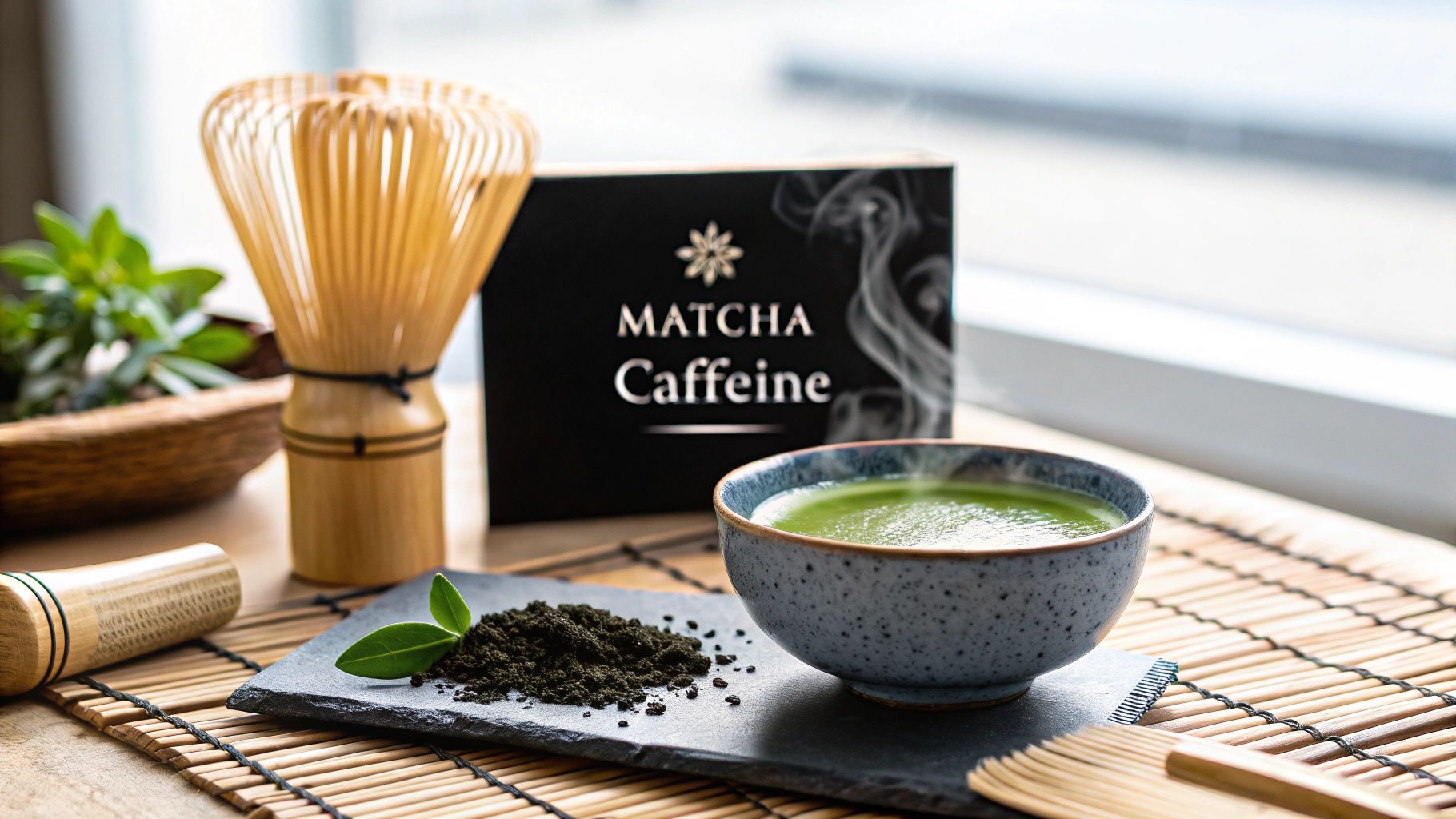When people think of a morning boost, coffee often comes to mind. But a matcha latte offers something different—a smoother, more sustained energy lift that sidesteps the notorious coffee jitters. This unique effect is down to a brilliant natural combination of caffeine and an amino acid called L-theanine, which work together to create a feeling of calm alertness.
Understanding Your Matcha Latte Caffeine Kick
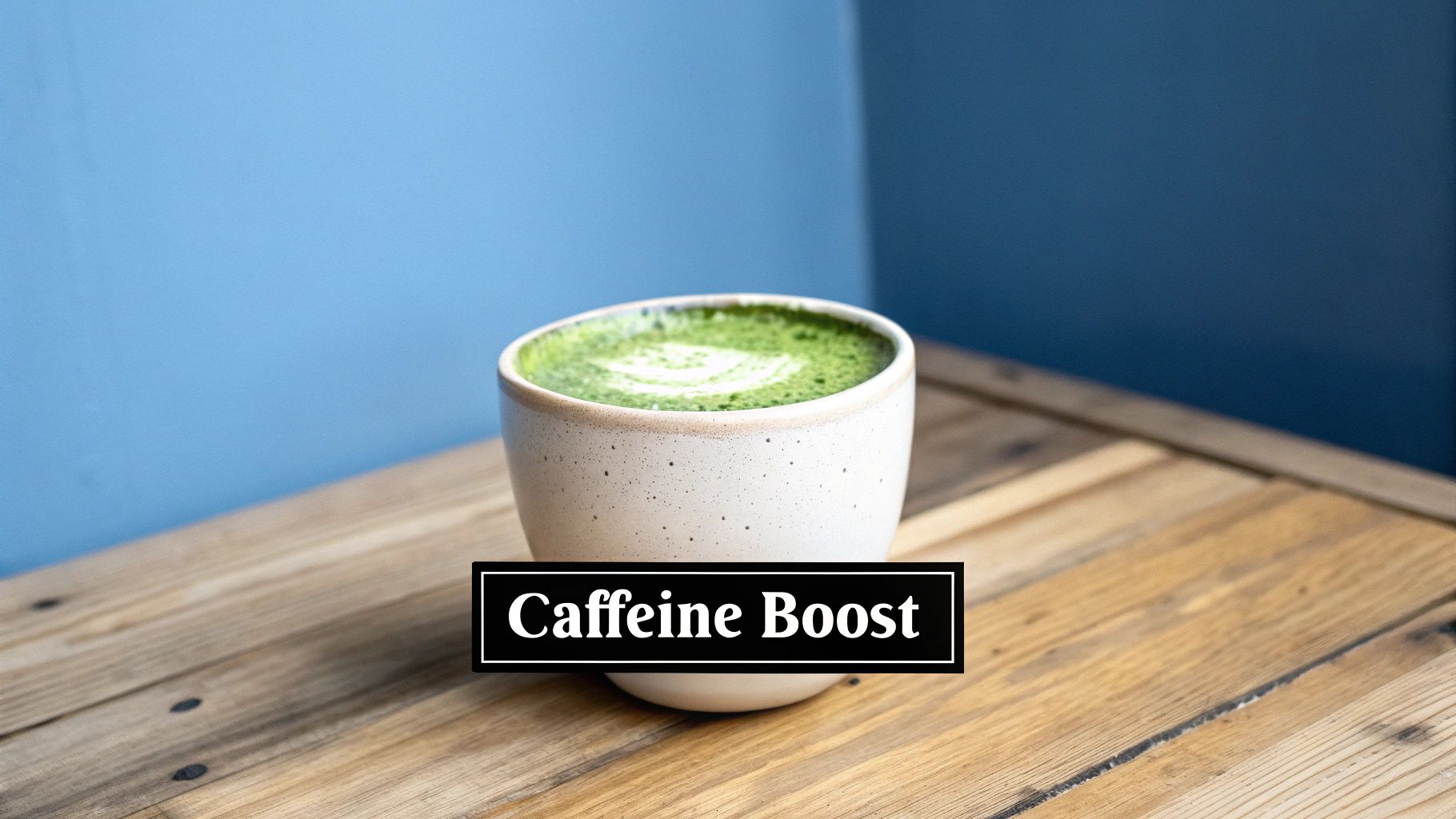
Sipping on a matcha latte isn’t just about getting a caffeine hit; it's a completely different kind of energy experience.
Think of the caffeine in coffee like a sprinter—it gives you a powerful, immediate burst, but it can often leave you feeling drained and crashing afterwards. Matcha, on the other hand, is more like a marathon runner. It provides a steady, enduring energy that helps you stay focused for hours.
This unique quality makes the matcha latte caffeine experience perfect for anyone wanting to avoid the common downsides of coffee, like anxiety or that dreaded afternoon slump. It’s a smarter, more balanced way to power your day.
So, how much caffeine are we actually talking about? In the UK, a standard serving of matcha powder contains around 34 milligrams of caffeine per gram. Since most lattes are made with about one gram of powder, you get a gentle lift that’s far less intense than your typical coffee. You can find a deeper comparison of matcha and coffee caffeine levels online. This controlled energy release is really at the heart of its growing popularity.
Let's take a quick look at how a matcha latte stacks up against other common drinks you might find in the UK.
Caffeine Quick View Matcha Latte vs Common Drinks
| Beverage (Approx. 225ml) | Typical Caffeine Content (mg) |
|---|---|
| Matcha Latte | 34 - 70 mg |
| Brewed Coffee | 95 - 165 mg |
| Espresso (Single Shot) | 63 mg |
| Black Tea | 25 - 48 mg |
| Green Tea (Brewed) | 25 - 29 mg |
| Coca-Cola Classic | 22 mg |
As you can see, matcha sits in a nice middle ground—stronger than a typical green tea but generally much milder than a standard cup of coffee.
The Power Duo Caffeine and L-Theanine
The real secret to matcha's smooth energy lies in the natural partnership between caffeine and an amino acid called L-theanine. This special compound is found in abundance in high-quality, shade-grown tea leaves, which are exactly what premium matcha is made from.
L-theanine works by slowing down your body's absorption of caffeine. This prevents the sudden spike and crash you might get from other caffeinated drinks. It also promotes alpha brain waves, which are linked to a state of relaxed alertness and mental clarity. This synergy is what allows you to feel both energised and composed.
This unique interaction is precisely why Buddhist monks have used matcha for centuries to aid in meditation. It cultivates a state of calm focus that’s difficult to achieve with other energy sources.
Of course, choosing a high-quality matcha is crucial if you want to experience this benefit fully. Premium blends, like our Amatsu Pure ceremonial-grade matcha, are made from the youngest, most nutrient-rich leaves. This ensures a higher concentration of both L-theanine and antioxidants, creating the foundation for that perfect, balanced energy you’re after.
Why Matcha Energy Feels Different From Coffee
Ever noticed how coffee can hit you like a freight train? You get that immediate, powerful jolt, but it's often followed by jitters and the dreaded afternoon crash. A matcha latte is a completely different story. It offers a smooth, focused alertness that feels both gentle and long-lasting, and the secret is all down to its unique chemistry.
This smoother energy isn't just your imagination; it's the result of a powerful partnership happening right inside the tea leaf. While matcha definitely has caffeine, it also contains a remarkable amino acid called L-theanine, and that changes everything.
The L-Theanine and Caffeine Synergy
You can think of the caffeine in coffee like a log on a fire. It catches light quickly, giving you a big, intense burst of energy, but it burns out just as fast, leaving you feeling depleted. The matcha latte caffeine experience, on the other hand, is more like a slow-burning ember.
L-theanine cleverly slows down how quickly your body absorbs the caffeine. This simple trick prevents the sharp spike in energy that so often leads to anxiety and restlessness with coffee. Instead of a sudden jolt, you get a steady, reliable stream of energy that can keep you going for hours.
L-theanine encourages the production of alpha waves in the brain—the very same brain waves associated with the relaxed, focused state you might find during meditation. This is the source of matcha's famous "calm alertness," making it perfect for focused work or creative projects.
This unique effect is precisely why high-quality matcha is so prized. The traditional Japanese method of shade-growing, which is essential for the best ceremonial grade teas, dramatically increases the amount of L-theanine in the leaves. This ensures you get the full benefit of this calming compound in every single cup. For a deeper dive into this, you can learn more about how matcha caffeine content compares to coffee in our dedicated guide.
Choosing Your Energy with Amatsu Matcha
Once you understand this synergy, you can start choosing a matcha that perfectly suits the kind of energy you're looking for. At Amatsu Matcha, our blends are carefully crafted to highlight these distinct benefits.
- For pure, balanced energy: Our Amatsu Pure ceremonial grade matcha is packed with L-theanine, delivering that classic calm-alert focus that matcha is famous for.
- For enhanced mental clarity: The Amatsu Shrooms blend takes it a step further, combining matcha with adaptogens to support concentration and cognitive function.
When you choose Amatsu Matcha, you’re not just picking a source of caffeine. You're selecting a sophisticated tool to manage your energy and focus. The quality of your matcha directly influences the quality of your energy, making it a crucial part of building your perfect daily ritual.
So, How Does Matcha Stack Up Against Other Drinks?
When you’re deciding what to drink to get your day going, it’s not just about the taste. It’s about how you want to feel. Choosing between a matcha latte, a coffee, or your usual cup of tea has a real impact on your energy levels, and matcha offers a unique sweet spot. It gives you a clear lift, but without that frantic, over-caffeinated feeling some other drinks can cause.
A standard cup of black coffee, for instance, can pack a punch with over 95 mg of caffeine, giving you a powerful, immediate jolt. A matcha latte made with a typical gram of powder is much gentler, usually landing somewhere between 34-70 mg. That more moderate dose is perfect if you're a bit sensitive to caffeine or just want to sidestep the jitters and anxiety a strong coffee can sometimes trigger.
Let’s Look at the Numbers
It's easier to see the difference when you compare them side-by-side.
This chart really puts into perspective where a matcha latte sits in the grand scheme of caffeinated drinks.
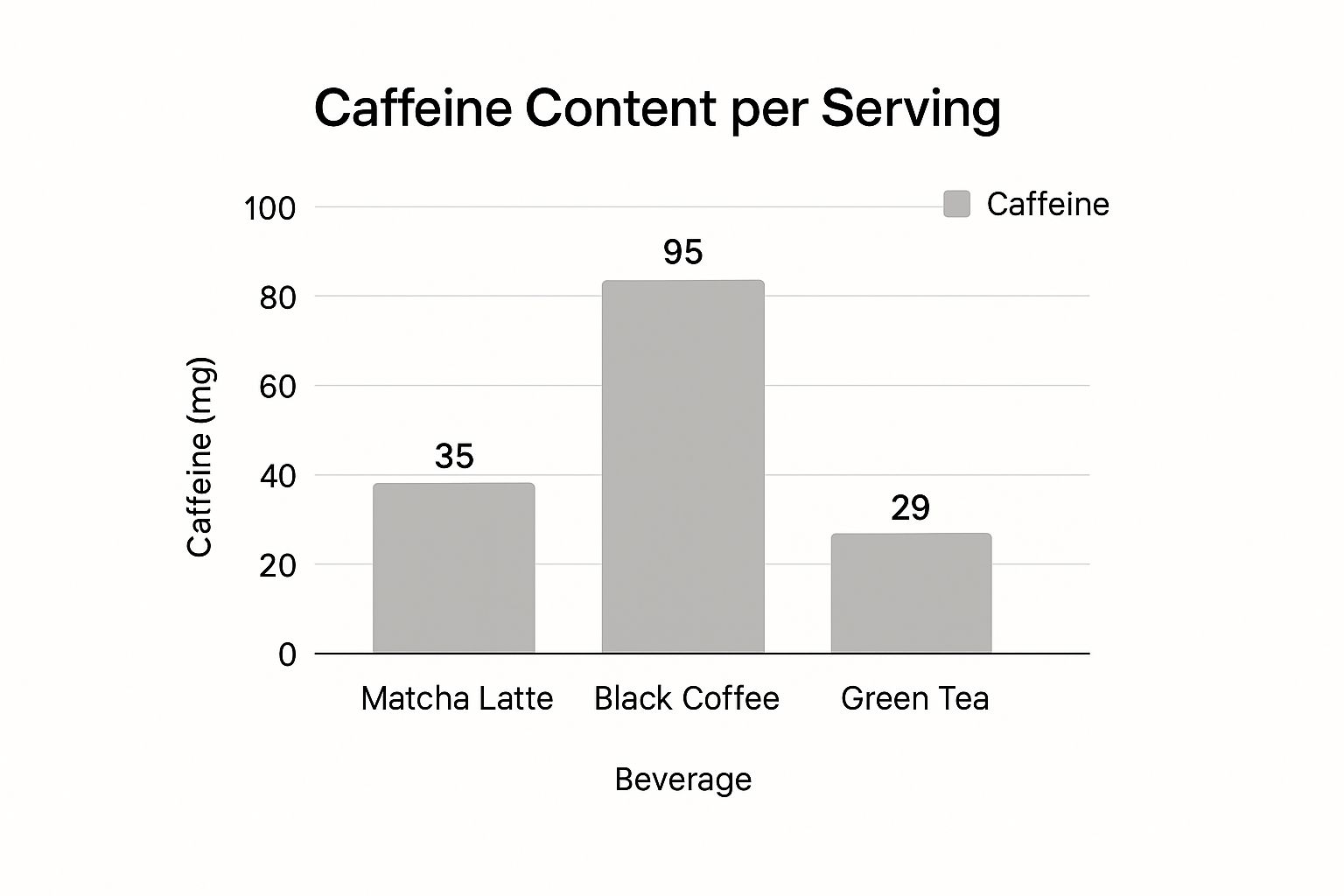
As you can see, coffee is definitely the heavyweight champion of caffeine. But a matcha latte still offers a more noticeable boost than a standard cup of green tea, making it a fantastic middle ground.
This is especially relevant here in the UK, where tea is still the go-to source of caffeine for most adults. While a coffee might contain around 90 mg of caffeine in a 200 ml cup, a matcha latte provides a lower—but still significant—lift from its 34 mg or so per serving. Our national love for tea shapes how we consume caffeine, and matcha fits right into that culture.
But it’s not just about how much caffeine is in your cup. It’s about the quality of the energy. Matcha’s secret weapon is L-theanine, an amino acid that works with caffeine to create a slow, steady release of energy. Think hours of calm, focused alertness instead of a short, sharp spike followed by a slump.
What About Espresso Shots and Energy Drinks?
If you're after something more intense, what about an espresso or an energy drink? A single shot of espresso contains about 63 mg of caffeine, delivering a very concentrated hit. Energy drinks, on the other hand, can be off the charts, often containing anywhere from 80 mg to over 150 mg of synthetic caffeine, not to mention a load of sugar and artificial ingredients.
While they might give you a quick fix, that rush often comes with a price. The clean, sustained energy you get from a high-quality matcha latte is a much more mindful way to support your body and mind. When you look at the full spectrum of matcha powder health benefits, you start to see why it’s such a fantastic choice for overall well-being.
By choosing a premium blend from Amatsu Matcha, you're tapping into that balanced energy, getting a clean lift without the unwelcome side effects. It’s about making a smarter, more informed choice for your daily ritual.
What Determines Your Matcha Latte's Caffeine Level
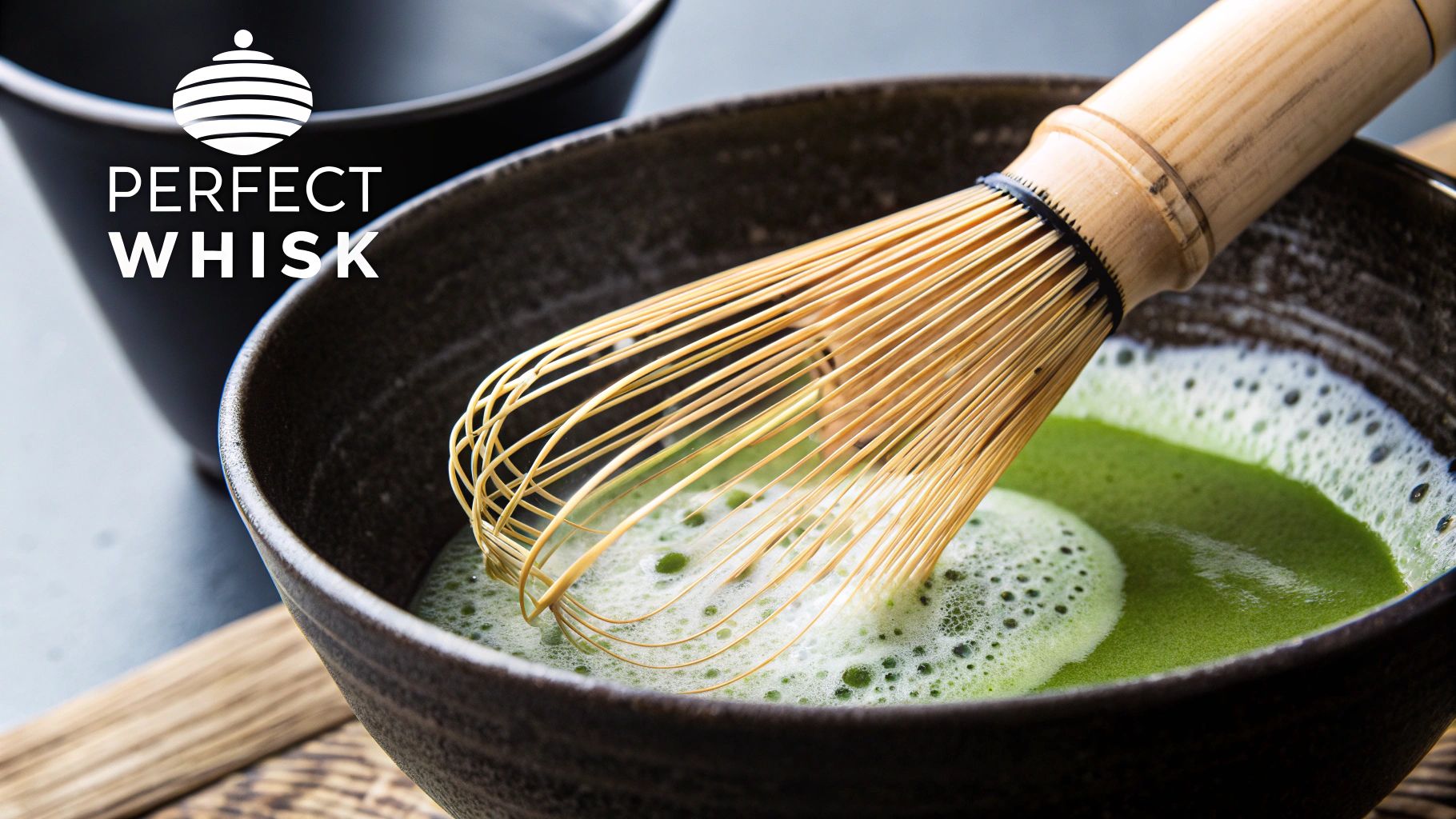
It’s a common misconception that every matcha latte packs the same punch. In reality, the amount of caffeine in your cup can vary quite a bit. Think of it less like a fixed measurement and more like a customisable dial.
Several factors come into play, and understanding them means you can become your own matcha barista, tweaking your drink for the perfect energy boost whenever you need it.
The single biggest influence is the grade of matcha you choose. Just as coffee beans differ in origin and roast, matcha comes in various qualities. Ceremonial grade matcha, which is made from the youngest and most delicate tea leaves, generally contains a higher concentration of both caffeine and the wonderful, calming amino acid, L-theanine.
The reason for this lies in the growing process. Tea plants destined for ceremonial grade are shaded for several weeks before harvest. This little trick forces the plant to ramp up its production of chlorophyll and amino acids, leading to that brilliant green colour, a smoother flavour, and a more potent, balanced lift. It’s exactly why a premium blend like our Amatsu Pure delivers such a clean, focused energy.
Key Factors Influencing Caffeine
Beyond the grade of the powder itself, a few simple choices you make during preparation will directly affect the final caffeine strength of your latte.
- How Much Matcha You Use: This one is pretty straightforward. A standard serving is typically one gram of matcha powder (that’s about half a teaspoon). If you decide to double it to two grams, you'll effectively double the caffeine.
- Water Temperature: While the amount of powder makes the biggest difference, the temperature of your water plays a small role too. Using hotter water, ideally around 80°C, can help extract slightly more caffeine from the powder than using cooler water.
- Milk and Other Goodies: Adding milk, sweeteners, or other ingredients doesn't actually remove any caffeine. What it does is increase the total volume of your drink. This means you sip the caffeine more slowly over time, which can make the energy release feel much gentler and less sudden. To see how all these components work together, you can dive deeper into what is in matcha powder with our handy guide.
The real magic of matcha is that you consume the entire ground tea leaf. Unlike regular steeped tea where you throw the leaves away, nothing goes to waste. This is why the quality of the powder is so important—you're getting all of its goodness, caffeine included.
When you look at the powder itself, the concentration of caffeine is surprisingly high. Even a small serving provides a noticeable effect because you're ingesting the whole leaf, giving you a much more direct dose than you’d ever get from simply infusing tea leaves in water. Research on matcha's chemical composition and its effects confirms this, highlighting just how potent this powdered green tea can be.
How To Adjust Your Matcha Caffeine Strength
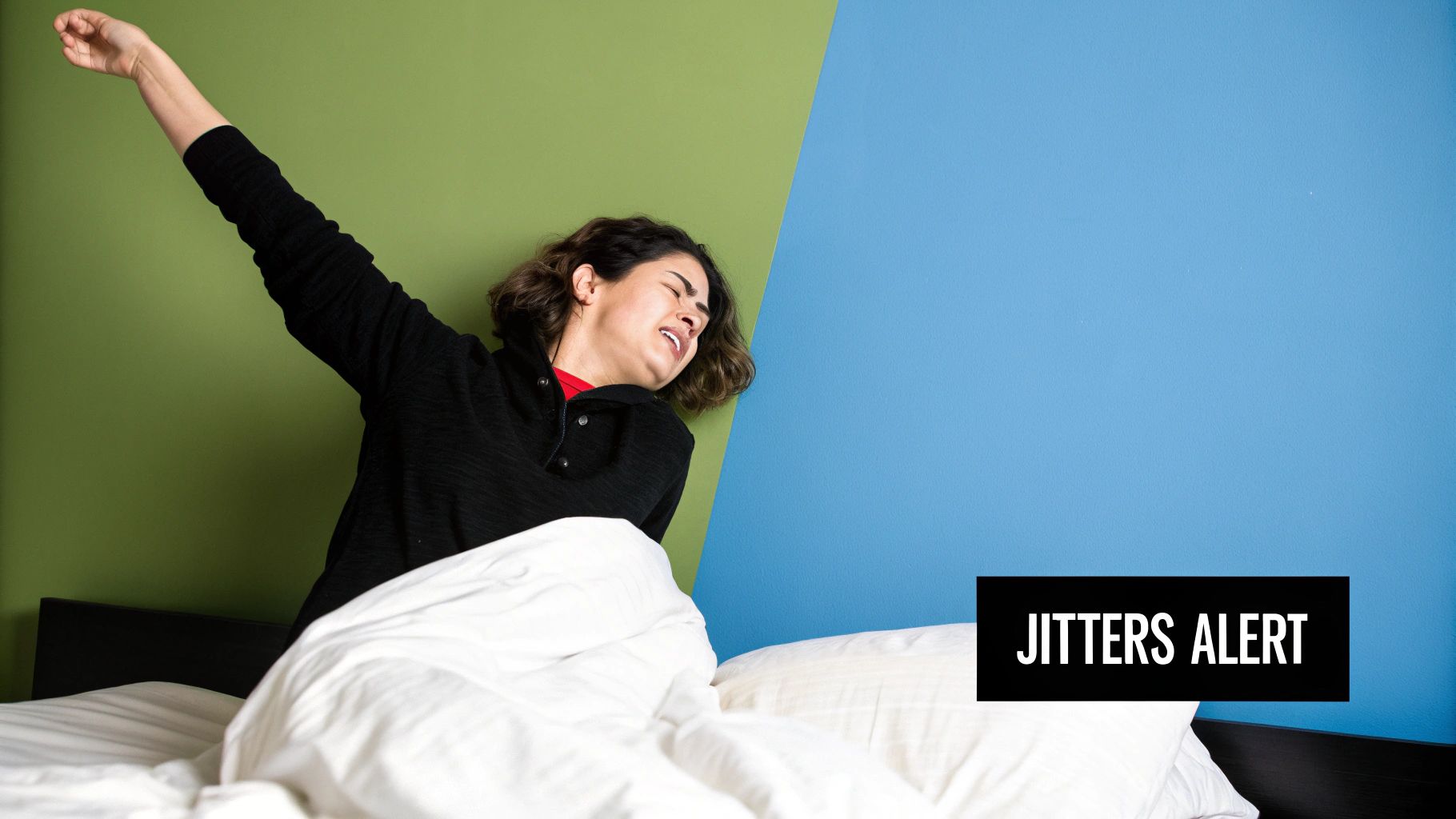
Knowing what goes into your matcha latte’s caffeine kick is one thing; learning how to control it is where the real fun begins. You're not stuck with a one-size-fits-all recipe. The beauty of matcha is that you can tailor its energy boost to perfectly match your day, whether you need a gentle morning nudge or a serious pre-workout lift.
The most straightforward way to manage the matcha latte caffeine is by playing with the matcha-to-liquid ratio. It's that simple. Think of your matcha powder as the volume dial for your energy and focus—you can turn it up or down whenever you need to.
This is exactly why having a few different matcha blends in your cupboard is a game-changer. At Amatsu Matcha, we’ve built our collection to give you this kind of precise control, letting you become the master of your own daily ritual.
Customising Your Caffeine Kick
It’s surprisingly easy to tweak your recipe for a stronger or milder effect. No complex brewing techniques required, just a few simple, deliberate adjustments.
Need a gentle start to your day or a calming afternoon cuppa?
- Use less powder: Try starting with just half a gram of matcha (that's about ¼ teaspoon). You'll get a much milder dose of caffeine but still enjoy all the lovely, calming benefits of the L-theanine.
- Add more liquid: Simply increase the amount of milk or water you add to your usual scoop of matcha. This dilutes the concentration, giving you a slower, smoother release of energy.
Looking for a powerful boost before hitting the gym or tackling a big project?
- Increase the powder: Upping the dose to two grams (a full teaspoon) will pretty much double the caffeine, giving you a much more noticeable and immediate lift.
- Pick a targeted blend: This is your most effective move. Our Amatsu Strength blend is specifically designed with creatine to support physical performance and deliver a serious energy hit. It’s the perfect choice when you really need that extra push.
By learning to adjust these simple elements, you transform a standard recipe into a personalised energy solution. Your morning latte can be a gentle nudge one day and a powerful motivator the next.
Beyond the Basics for Fine-Tuned Focus
Sometimes it's not about raw power. You need sharp, sustained focus. For those moments when mental clarity is the real prize, the blend you choose makes all the difference.
Our Amatsu Shrooms blend, for example, combines top-quality matcha with adaptogenic mushrooms. This creates a wonderful synergy that enhances focus and cognitive function with a beautifully balanced, gentle energy. It’s the ideal partner for creative work or deep concentration.
If you're just starting out on your matcha journey, our complete guide on how to make a matcha latte is the perfect place to learn the fundamentals before you start experimenting.
Your Guide to Choosing the Right Amatsu Matcha
So, you've seen how the caffeine in a matcha latte offers a different kind of energy. Now comes the fun part: picking the right blend to fit into your day. Swapping your usual coffee for matcha isn't just a like-for-like change; it’s a conscious move towards a smarter, more balanced energy source. You're essentially choosing sustained focus over frantic jitters and a smooth, gentle lift instead of a sudden crash.
The Amatsu Matcha collection was created with this in mind. We wanted to make it easy for you to find exactly what you’re looking for. Every blend starts with our premium ceremonial-grade matcha, so that signature calm-alert feeling is guaranteed in every cup.
Find Your Perfect Amatsu Blend
Take a moment to think about what you want from your daily ritual. Are you aiming for pure, uncluttered focus? A little boost for your skin and hair? Or maybe something to power up your workout? We’ve got a blend for that.
- For Classic, Clean Energy – Amatsu Pure: If you’re after that quintessential matcha experience—steady, all-day energy and a clear head—our ceremonial-grade Pure blend is the perfect place to start.
- For an Inner Glow – Amatsu Radiance: We’ve combined our exceptional matcha with marine collagen in this blend. It’s designed to support your skin, hair, and nails while still giving you that gentle, focused lift.
- For Sharper Focus – Amatsu Shrooms: This one’s brilliant for deep work or study sessions. We pair our matcha with adaptogenic mushrooms like Lion's Mane to help support cognitive function and mental clarity.
- For Peak Performance – Amatsu Strength: When you need a serious boost before hitting the gym, our Strength blend is your go-to. It's enriched with creatine to help with energy production and muscle recovery.
Choosing the right matcha isn’t just about the flavour. It’s about matching your drink to your goals and creating a ritual that genuinely works for you.
Ready to feel the difference that high-quality matcha can make? Take a look at the full Amatsu Matcha collection and find the blend that feels like it was made just for you.
A Few Lingering Questions About Matcha Latte Caffeine
Even with all the details laid out, you might still have a question or two buzzing around. That’s perfectly normal—getting to know your daily drink is a smart move. Let's tackle some of the most common curiosities we hear.
Is Matcha Latte Caffeine Addictive?
One of the best things about matcha is that it doesn't tend to create the same kind of dependency you see with coffee. Coffee gives you a fast, hard hit of caffeine, a sharp spike that your body can quickly start to crave. That's what leads to those infamous withdrawal headaches if you skip a day.
Matcha works differently. Its caffeine is released into your system slowly and smoothly, thanks to its natural partnership with L-theanine. This unique combination helps you sidestep the harsh energy spikes and crashes, making it far less likely that your body will become reliant on it. You get to enjoy your daily ritual without the worry of a difficult withdrawal.
Will a Matcha Latte Keep Me Up at Night?
Well, it is caffeinated, so it definitely has the potential to mess with your sleep if you drink it too close to bedtime. Your average matcha latte has somewhere between 34 and 70 mg of caffeine—less than a typical coffee, but still enough to have an effect.
The good news is that the calming influence of L-theanine often makes the energy feel less jarring and jittery than what you get from coffee. A good rule of thumb is to avoid any caffeinated drinks, matcha lattes included, for at least six hours before you plan to sleep. Ultimately, listening to your own body's sensitivity is the most important thing.
Can I Drink a Matcha Latte Every Day?
Absolutely! Making a matcha latte part of your daily routine can be a fantastic, healthy habit. It's packed with antioxidants and provides that unique calm-alert energy, making it a sustainable choice for a daily pick-me-up.
For most people, 1-2 servings a day is a great sweet spot. As with anything, moderation is key, as is starting with a high-quality matcha powder. If you want to dive even deeper into how these two drinks stack up, our guide on matcha vs coffee for clean energy and wellness has all the details.
Ready to create your perfect daily ritual? Explore the Amatsu Matcha collection and discover a blend that supports your energy, focus, and wellness goals. Find your new favourite at https://amatsumatcha.com.
Read more
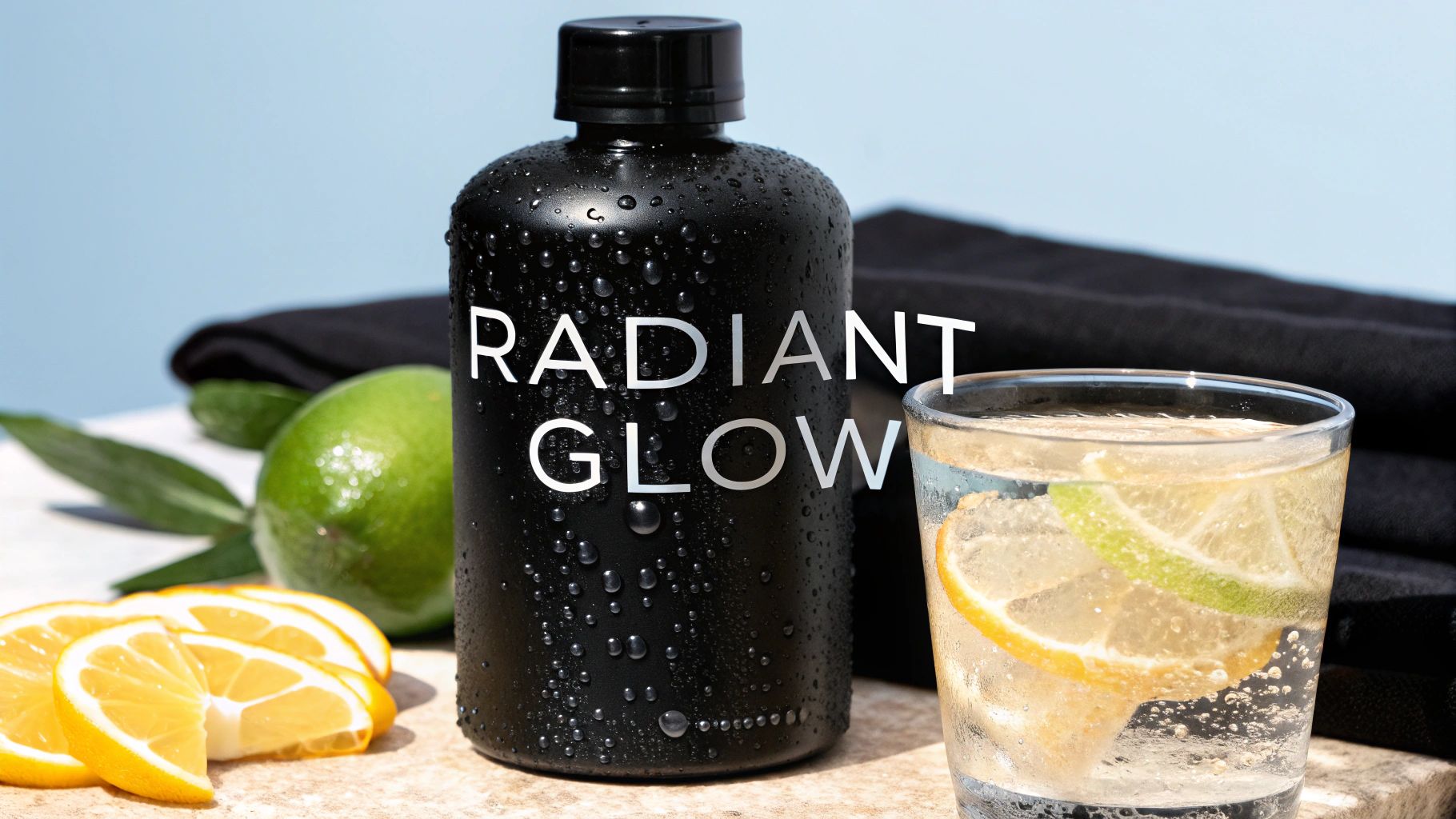
Discover how collagen drinks for skin can transform your routine. Our UK guide explains how they work, what to look for, and how to get that radiant glow.
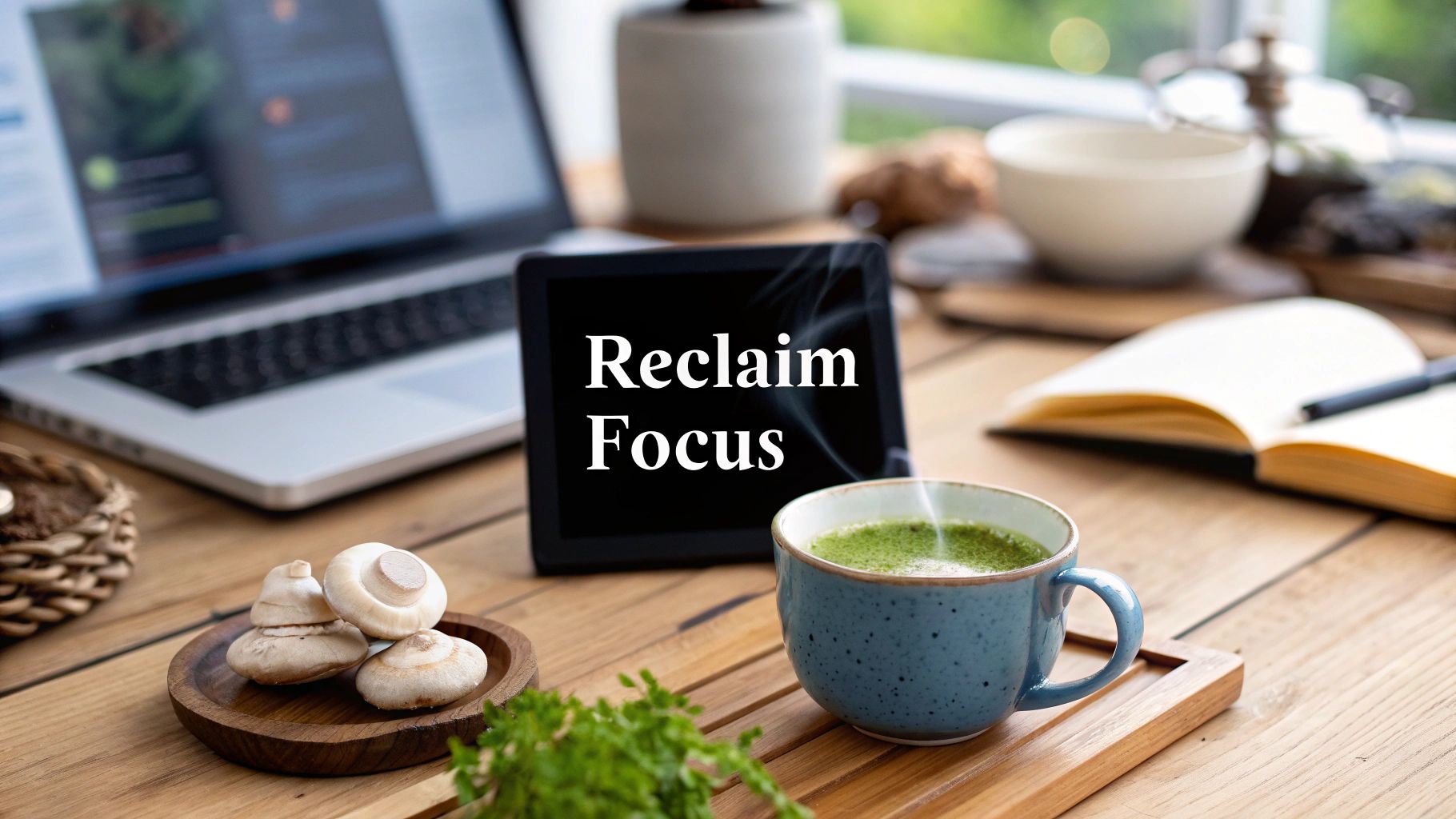
Feeling foggy? Discover powerful natural remedies for brain fog, from diet and lifestyle changes to adaptogens, to restore your mental clarity and focus.
